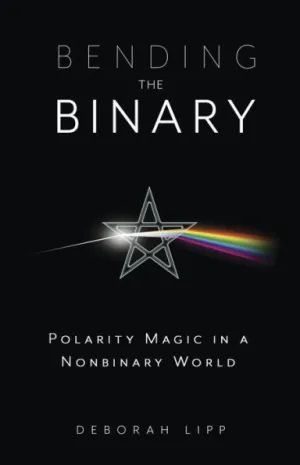Rarely has a reviewer and a book bumped into each other at a better time. Within my spiritual group there has been a conversational trickle that has swelled over the last few years into a healthy river of discourse, all around the place of traditional gender roles in our rituals. While our tradition is eclectic, we've had many of the classic calls to Goddess and God in their various guises, as well as roles for High Priestess and High Priest (among others). Some of these have already been modified, but other instances are requiring a lot of careful consideration. Does this sound like you or your group at all? If so, Deborah Lipp's Bending the Binary may be just what you're looking for.
To be clear, this book isn't only based on perceived gender binaries, and that's refreshing. Lipp identifies numerous instances of polarities (as she calls them) in witchcraft, including "self and other", "dominance and submission", as well as gender. If your reaction to this is "but those aren't strict binaries!" then award yourself 5 points, because this is one of Lipp's key points. She identifies polarity as "[t]he presence of contrasting energies, forces, or conditions that attract one another, thereby generating power." Including the reframing of rigid binaries into relative polarities is a powerful shift in thought. Rather than trying to reconcile the traditional binaries that, increasingly, are at odds with the march of progress in society Lipp demonstrates that these continuums are still useful when viewed appropriately. After all, the moon isn't *only* full or new, a person typically isn't *wholly* passive or active in their lives, and likewise one isn't necessarily fully male or fully female, and yet these forces and influences can act upon us. This reworking can be subtle, such as substituting the names of roles in ritual to be neutral or even queered, but it can be more profound. In Chapter 3, "Polarity and Sexuality" Lipp dives straight in to what a reader might be hesitant to dip their toes, breaking down the Great Rite (in both "symbolic" and "true" forms) to find what component parts can be seen deep in the heart of them, and then building back out from there in a way that allows for a far less rigid reading of them than traditionally occurs.
There is a wonderful play by Bill Cain called "Equivocation", set in 17th century England and telling a fictionalized version of events surrounding the creation of William Shakespeare's "Macbeth." It's about a lot of things and mostly is beyond the scope of this review, but at one point a character describes a hypothetical situation that places a scrupulously honest person in the predicament of lying or letting a fugitive he is harboring be killed during a search. This character explains that it is critical to hear the true question and to answer that. You are, he explains, actually being asked "may I come in and kill this man?" and so can truthfully answer "no", despite the questioner's words being other than these. I found myself thinking back on this play several times while reading Bending the Binary. Lipp does a phenomenal job, chapter by chapter, in looking at numerous situations of traditional binary/polar situations in magical traditions and asking, in effect, "what is really the point of this?" Going back to the Great Rite example above, she posits that the coming together of opposites, or the culmination of love between avatars of the Goddess and God, are more common views on the Rite as opposed to "this woman and this man shall make love." Shorn of such hetero-normative constraints the Great Rite is returned to the liturgy (so to speak) of spiritual groups who may have left it behind because of its traditional connotations.
While I've used gender-based dualities as my chief examples, Lipp goes far beyond this dynamic. She demonstrates how the tension between looking inward versus looking outward can generate energy of its own sort, which can in turn be harnessed for particular magical/ritual purposes. Likewise with passive and active outlooks, dominant and submissive behaviors, and so on. This is not her first foray into these topics; going back to at least 2003 she has been examining what she calls polarities in her book "The Elements of Ritual." Clearly, however, time has given her a deeper understanding of her material and it shines through in this book. A word of warning - this is not for the new practitioner. Not to "gatekeep" as the kids say; obviously you pays your money and you takes your chance, should you like. I do think that meditating on topics that are as deep down in the weeds as these can drag the novice far afield and (in my opinion, naturally) muddy waters that they are just starting to swim in. If you feel your practice is sailing smoothly at this point, I'd have Deborah Lipp's Bending the Binary towards the very top of my list of to-reads.
~review by Wanderer
Author: Deborah Lipp
Llewellyn Publications, 2023

